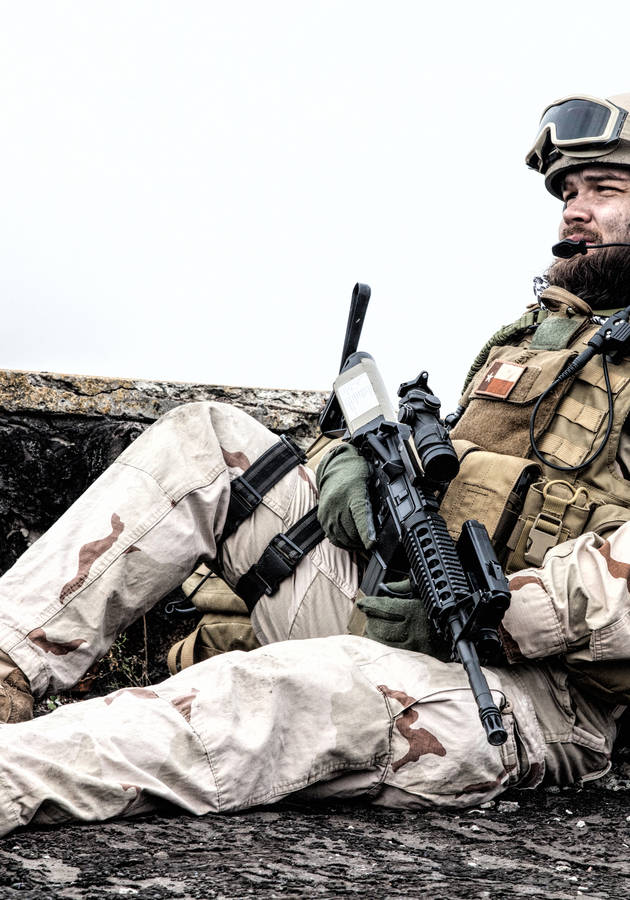Former U.S. Navy SEAL officers Jocko Willink and Leif Babin served in SEAL Task Unit Bruiser during some of the bloodiest conflicts of the Iraq War. In “Extreme Ownership,” they take the lessons from the battlefield and translate them into easily applicable business principles.
So, get ready to learn how to lead your company Navy-style – and why this is the only style you’ll ever need.
Before the battle: winning the war within
A truth as old as Sun Tzu: to be able to win the war on the battlefront, you must first learn how to win the war within yourself. Implement the following four key strategies – and you (or your company) should be good to go:
- Extreme ownership. Back in 2006, Willink served as the Navy SEAL commander of the elite Task Unit Bruiser during the Battle of Ramadi, one of the decisive conflicts of the Iraq War. One day, during a carefully planned operation, the unit was caught in friendly fire. But before Willink could realize this, one SEAL had been fragged in the face. Nothing especially serious, but bad enough to force Willink to cut the operation short. Angry and frustrated, he started collecting information. After a while, he gathered his team for a presentation. “Whose fault was this?” – he asked his teammates. One by one, they all tried to take the blame – but Willink was adamant: “Wrong,” he kept on saying. “It wasn’t your fault.” At the end of the briefing, he stood before the group and, after taking a breath, calmly said: “There is only one person to blame for this: me. I am the commander. I am responsible for the entire operation.” This act exemplifies what extreme ownership really is. As Willink writes, “in any organization, all responsibility for success and failure rests with the leader. The leader must own everything in their world. There is no one else to blame. The leader must acknowledge mistakes and admit failures, take ownership of them, and develop a plan to win.”
- No bad teams, only bad leaders. Extreme ownership is not only about leaders owning up to their mistakes, but also about what actions do to the mindset of their subordinates. “There are no bad units, only bad officers,” wrote Colonel David Hackworth in one of his books. “This captures the essence of what Extreme Ownership is all about,” comments Babin. “It’s not what you preach, it’s what you tolerate. When setting expectations, no matter what has been said or written, if substandard performance is accepted and no one is held accountable – if there are no consequences – that poor performance becomes the new standard. Therefore, leaders must enforce standards.” In other words, accountability is contagious: refuse to take responsibility as a leader, and you’ll engender a culture of finger-pointing and distrust; on the other hand, shoulder the blame – and your subordinates will be stimulated to take full responsibility for their actions.
- Believe. To convince and inspire their subordinates to follow and accomplish a mission, a leader must be a true believer in what the mission entails. They must be aware, at all times, that they are part of something bigger than themselves. If they have any doubts – those will be reflected several times over in the performance of their followers. “Far more important than training or equipment,” warns Willink, “a resolute belief in the mission is critical for any team or organization to win and achieve big results […] The leader must explain not just what to do, but why. It is the responsibility of the subordinate leader to reach out and ask if they do not understand. Only when leaders at all levels understand and believe in the mission can they pass that understanding and belief to their teams so that they can persevere through challenges, execute, and win.”
- Check the ego. There’s no “I” in “team” for a reason. Leaders need to learn to check their egos and inspire a culture of humbleness in their subordinates as well. Getting cocky or complacent is a sure way to failure and defeat. That’s why controlling the ego is essential and why one of the keywords in the Extreme Ownership leadership approach is “humility.”
During the battle: the laws of combat
People erroneously claim that there are no rules in love and war. Long aware that this isn’t true, the Navy SEALs have actually developed four unofficial tactical guidelines, four time-tested “laws of combat.” Immutable and absolute as Newton's natural laws, all of them are applicable to the business world.
- Cover and move. During one particular operation in Ramadi, Babin’s SEAL unit found itself far behind enemy lines with no backup in sight. Babin did his best to take his soldiers out to safety. A daunting task, but, eventually, they all made it – through solid street gunfight and in broad daylight. Surprisingly, the platoon chief wasn’t impressed. “What the hell were you guys doing out there?” – he sternly asked Babin. It was only later, thanks to the chief’s explanation, that Babin realized his grave mistake: he was so focused on his team’s problems that he failed to take into consideration the big picture. Namely, there were SEAL snipers in their area who could have overwatched their position. Going forward, he never forgot his chief’s advice on this occasion: cover and move, the fundamental law of combat. “Cover and move,” in simpler business terms, means “teamwork,” which means collaboration before competition. No matter how small, the role of all members in a team is important – as is the role of all teams within an organization: the focus must not be on them but on the mission. “All elements within the greater team are crucial and must work together to accomplish the mission, mutually supporting one another for that singular purpose,” explains further Babin. “Departments and groups within the team must break down silos, depend on each other and understand who depends on them. If they forsake this principle and operate independently or work against each other, the results can be catastrophic to the overall team’s performance.”
- Keep things simple. The second law of combat is simplicity. Being able to simplify things is crucial to success because when something goes wrong – and things always go wrong – the more complex the underlying network of connections, the less manageable the spiraling out of control becomes. You can’t expect team members to focus on their mission if mission assignments are not simple and clearly defined. Just as well, nobody can be held accountable if their actions are not outlined from the beginning.
- Prioritize and execute. Solving more than one problem at a time can be overwhelming. And when the lives of other people are at stake, you can’t risk losing your marbles at no point whatsoever. That’s why the third law of combat is “prioritize and execute,” verbalized by Navy SEALs in the following mantra: “Relax, look around, make a call.” This is, of course, applicable in business as well. To implement this strategy, start by evaluating the highest priority problem. Then, lay it out in “simple, clear, and concise terms” for your team. Next, move on to developing and determining a solution – if possible, with the help of your teammates. Depending on the situation, you might sometimes need to do this fast. But that’s a risk you’ll have to take: doing something is much better than doing nothing. Once you’ve reached a solution, direct its execution, “focusing all efforts and resources toward this priority task.” Only then you should move to the next highest priority problem. Priorities may, of course, shift midstream, so it’s important to both “maintain the ability to see other problems developing” and “pass situational awareness both up and down the chain.”
- Decentralized command. The last law of combat is decentralized command. As a general rule of thumb, no person can effectively manage more than ten people. Your company is probably much bigger. So, do what the Navy SEALs do: divide your company into small teams – each no more than four to five members – and assign a leader to each of these teams; delineate their responsibilities from the outset – decentralized command doesn’t mean junior leaders operating on a program of their own. Moreover, decentralized command is directly related to belief: all junior leaders must believe in the mission and be aware of not just what to do but why they are doing it. If this is not the case, they must ask their boss until all the why’s are clarified.
After the battle: sustaining victory
One battle doesn’t win a war, and neither does a won war secure a calm future. You need to learn how to sustain your victories – and you need to do that in the following manner:
- Plan. All planning should begin with mission analysis. You need to understand it not only in relation to your role, but also in relation to the intent and the endstate (the goal) of your superiors. Next you need to identify personnel, assets, resources, and time available. The third step is to decentralize the planning process and empower the junior leaders with clearly defined decision-making responsibilities. Then, you should determine a specific course of action – the simpler it is, the better. Remember to consider likely contingencies through each phase of the operation. Identify the risks and devise mitigation strategies from the outset. Then, stand back while continually checking and questioning the plan against emerging information to ensure it still fits the situation. After the operation, analyze what went right and what when wrong. Try to implement the lessons learned in future planning.
- Leading up and down the chain of command. Decentralized command is a winning strategy in peacetime as well. To make sure it works, never question the decisions of your superiors before your subordinates. Voice your concerns and dilemmas up the chain. When you have none, start executing the plan as if it is your own. “Take responsibility for leading everyone in your world, subordinates and superiors alike,” writes Babin. “If someone isn’t doing what you want or need them to do, look in the mirror first and determine what you can do to better enable this. Don’t ask your leader what you should do, tell them what you are going to do.”
- Decisiveness amid uncertainty. Combat leaders rarely have the full picture when it matters the most. That’s why they train to be prepared to act decisively amid uncertainty. Sometimes, they may make a mistake, but it’s better to make an educated guess than do nothing – the latter is a mistake every time. Good leaders are great in optimal conditions; but only great leaders are comfortable in the chaos.
- Discipline equals freedom. English poet Alexander Pope once wrote that “those move easiest who have learned to dance.” Contrary to common belief, freedom is not the absence of chains – it is being able to choose your chains. Without discipline, there is no progress. With it – there is progress in the desired direction.
Final Notes
Described by radio host Don Imus as “the smartest, most revolutionary management approach since Jack Welch’s Six Sigma,” “Extreme Ownership” is, truly, an exceptional book.
A must-read for every leader.
12min Tip
Take responsibility for your actions. Being able to say it’s your fault is not only courageous but also contagious – and befitting a great leader.





























